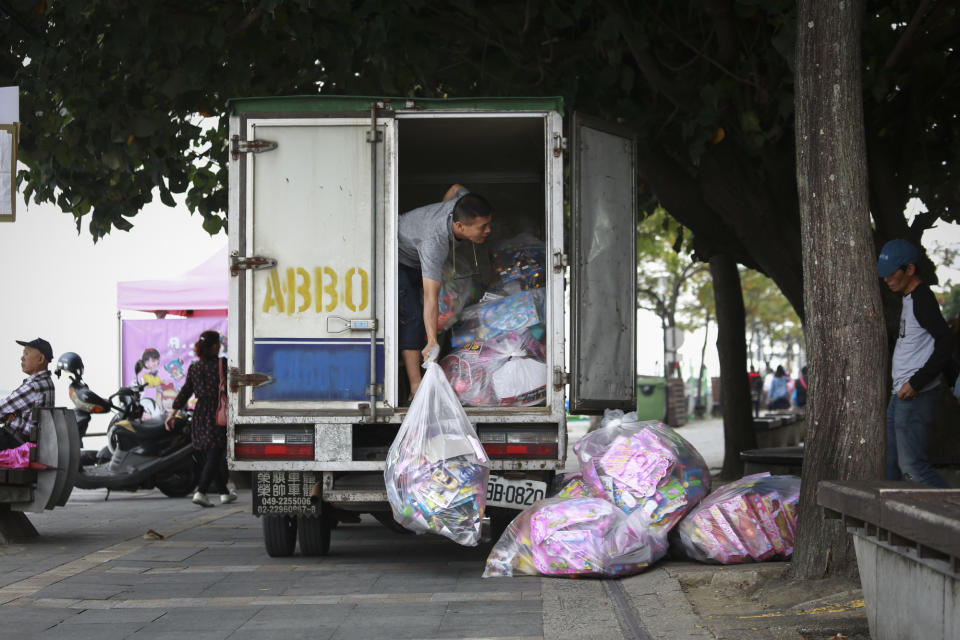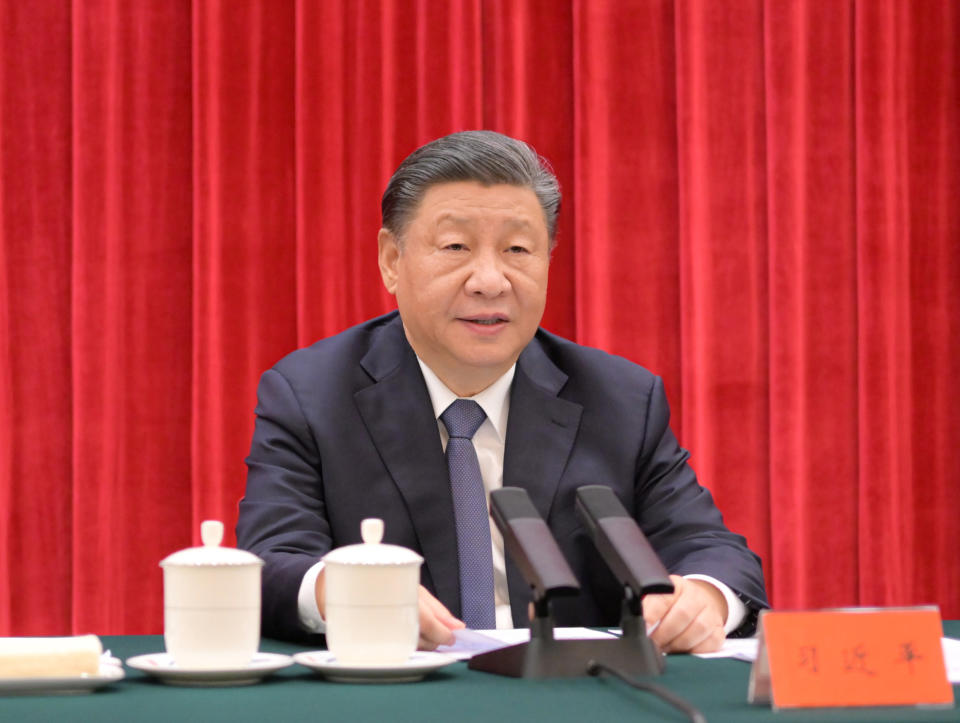Global Impact: as Taiwan heads to the polls, what does the island's presidential election mean for cross-strait and US-China relations?
In just one week, the hotly anticipated presidential and legislative elections in Taiwan will be finished, and the choice of the self-ruled island's voters will finally be known.
Candidates of the ruling Democratic Progressive Party (DPP), Beijing-friendly Kuomintang (KMT) and Taiwan People's Party (TPP) are vying for the top job, following years of strained cross-strait relations since Tsai Ing-wen of the independence-leaning DPP was first elected president in 2016. Voters will also be electing a new legislative body.
Do you have questions about the biggest topics and trends from around the world? Get the answers with SCMP Knowledge, our new platform of curated content with explainers, FAQs, analyses and infographics brought to you by our award-winning team.
The stakes are particularly high, as the crucial election on January 13 is poised to shape cross-strait relations as well as bilateral ties between mainland China and the United States.
The DPP candidate, Vice-President William Lai Ching-te, is currently ahead in the polls, ahead of KMT's Hou Yu-ih and TPP's Ko Wen-je. The KMT, though, has a slight lead in the polls for the 133 legislative seats.
In the lead-up to the widely watched election, presidential candidates have been scrambling to assure voters that they are the best choice to achieve cross-strait peace. Tensions have been high as Beijing has stepped up military, political and economic pressure on the self-ruled island, particularly over the past year.
They have also centred the issue in televised pitches to voters, with Hou calling on Lai to renounce his pro-independence stand, citing concerns over war, while Lai accused the KMT of creating an identity divide on the island with its embrace of the "one-China shrine".
Beijing has warned of the risks of war if the DPP stays in power, and slammed "pro-independence forces" in Taiwan for sowing chaos in the Asia-Pacific region.
Mainland China has been flexing its muscles in that regard, with intensified military operations around the island and the suspension of tariff cuts in response to what it perceives as increased attempts to bolster separatist forces and solidify Taipei's ties with Washington.
Major military drills were carried out after Tsai met then-US House speaker Kevin McCarthy during an April stop in California. In August, the People's Liberation Army also staged drills in response to Lai's layovers in New York and San Francisco.
Lai's ticket with Hsiao Bi-Khim, Taiwan's former de facto ambassador to the US, has been hailed by DPP lawmakers as a "perfect match" that has boosted the chance of victory.
KMT and TPP had aimed for a joint ticket to improve their chances to beat the DPP, but the deal collapsed in late November in a potential blow to Beijing, which has described Lai and Hsiao as dangerous "separatists" and "troublemakers".
Efforts to build a KMT-TPP joint ticket were shepherded by former Taiwanese president and KMT head Ma Ying-jeou. Ma visited mainland China early last year, a historic first trip by a former or sitting Taiwanese leader.
Months before the elections, Beijing unveiled a sweeping guideline to turn Fujian province, located on the west coast of the Taiwan Strait, into a model zone for integration - a clear statement of intent for the continued advancement of what it terms "peaceful reunification".
And in December, President Xi Jinping called cross-strait unification an "overall trend, a righteous cause, and the common aspiration of the people" as he led commemorations marking the birthday of late leader Mao Zedong.
Beijing views Taiwan as part of China which must be reunited, by force if necessary. Most countries, including the US, do not recognise Taiwan as an independent state, but Washington is opposed to any attempt to take the self-governed island by force and is committed to arm Taiwan.
At their summit in November, Xi told his US counterpart Joe Biden that Taiwan is the "most dangerous" issue in the two countries' bilateral relations.
Facing ramped up pressure, Taipei has aimed to boost its defence capabilities, including extending mandatory military service from four months to a year and explicitly boosting its capacity for asymmetric warfare.
The island also opened its first training centre for tactical combat casualty care in December.
Growing distrust and hostility between Taipei and Beijing is affecting journalists, with those from mainland China facing especially strict barriers to covering the elections on the ground.
Despite restrictions, observers and academics will be closely following these results to see how the important and complex relationships across the Taiwan Strait, and beyond, will change over the next four years.
Fallout from Taiwan elections risks creating further mistrust in US-China relations, analyst warns
Beijing urges Taiwanese to 'stand on right side of history' ahead of presidential election
Opinion: Global markets bracing for a 2024 full of potentially volatile elections
President Tsai Ing-wen weighs in after DPP's William Lai faces new independence row
Chinese President Xi Jinping pledges reform in future-focused New Year's address
Controversy over cuts to classical Chinese content heats up presidential race

Illustration: Lau Ka-kuen alt=Illustration: Lau Ka-kuen>
Ballot power: 2024 elections could steer global relations for years to come
The world's democracies will hold more than 60 national elections this year, a number that will not be reached again until 2048
The US vote has greatest import for relations with China, but so do those in Taiwan, Indonesia, India and Mexico, among others
The year 2023 was marked by an escalating rivalry between China and the US-led West, compounded by growing fears of conflict over Taiwan, military tensions in the South China Sea, Russia's continued invasion of Ukraine, and a new Middle East war between Israel and Hamas.
So the new year is saddled with a bitterly divided geopolitical landscape, complicated international cooperation on climate change, economics, trade and technology, as well as a dangerous arms race. And with a packed election calendar, 2024 could be a true global inflection point.

Illustration: Davies Christian Surya alt=Illustration: Davies Christian Surya>
Can US and China give each other the reassurances they want on Taiwan?
The coming summit between Xi Jinping and Joe Biden offers an opportunity to lower the temperature on a highly sensitive topic
January's elections in Taiwan could create further volatility because Beijing views front runner William Lai as a 'troublemaker through and through'
Taiwan has long been the flashpoint of the China-US relations with Beijing repeatedly warning Washington that mishandling the issue is likely to have a devastating impact on the relationship.
Meeting in Bali last year, Chinese President Xi Jinping told his US counterpart Joe Biden that Taiwan was "the first red line" that must not be crossed.

Illustration: Henry Wong alt=Illustration: Henry Wong>
How Taiwanese presidential candidates' US tours helped 'clear misperceptions'
DPP, KMT and TPP candidates have visited the US in recent weeks, meeting informally with foreign-policy makers and officials
DPP's William Lai played down his independence rhetoric while KMT's Hou played up support for a strong military, analysts say
Three months before Taiwan's presidential election, the main contenders have mostly wrapped up efforts to garner support in Washington, and, analysts say, managed to convince policymakers that they do not seek to cross any red lines set by the US or Chinese governments.
With military tensions in the Taiwan Strait and around the island reaching unprecedented levels, their audiences were mostly looking for assurances from the Democratic Progressive Party (DPP) candidate that he would not declare independence; from the opposition Kuomintang (KMT) candidate, they wanted to know that he would not work to appease Beijing.

Photo: James Wendlinger alt=Photo: James Wendlinger>
Halting tariff cuts mainland China's 'early warning' ahead of Taiwan election
Twelve products from Taiwan under the Economic Cooperation Framework Agreement (ECFA) will be affected from January 1
But analysts say the price of commodities is around 0.5 to 2 per cent of the total exports from Taiwan to mainland China
Beijing has sent an early warning against possible economic fallout should Taiwan's election result next month lead to a further deterioration of ties, analysts said, as mainland China suspended tariff reductions on several Taiwanese products under a landmark trade-deal on Thursday.
Imports of 12 products from Taiwan, including propylene and paraxylene, covered by the cross-strait Economic Cooperation Framework Agreement (ECFA) would be affected from January 1, according to the Customs Tariff Commission of the State Council.

Photo: Xinhua alt=Photo: Xinhua>
Xi says Taiwan unification will 'surely' happen as he marks Mao anniversary
The Chinese president leads a ceremony honouring the former leader at Tiananmen Square in Beijing on Tuesday
Xi tells event to mark Mao's 130th birthday that 'complete reunification of our motherland is a righteous cause'
Chinese President Xi Jinping paid tribute to Mao Zedong and hailed his political teachings on Tuesday, the 130th anniversary of the late leader's birth, saying mainland China will "surely" be unified with Taiwan in the future.
"The complete reunification of our motherland is an overall trend, a righteous cause, and the common aspiration of the people. Our motherland must be reunified, and it will surely be reunified," Xi said in his speech delivered at the Great Hall of the People in Beijing.

Photo: EPA-EFE alt=Photo: EPA-EFE>
Taiwan election hopeful Lai says KMT's embrace of 'one China' is dividing island
Vice-president and DPP candidate suggests a win for his main rival, Hou Yu-ih, could spell disaster
Lai says Kuomintang used to be anti-communist but senior figures are now trying to placate Beijing
Taiwan's presidential front runner William Lai Ching-te has claimed his Kuomintang rival's embrace of the Communist Party and "one China" is dividing the self-ruled island.
Lai, vice-president and candidate for the independence-leaning Democratic Progressive Party in next month's election, made the remarks in a televised pitch to voters on Wednesday.
Global Impact is a weekly curated newsletter featuring a news topic originating in China with a significant macro impact for our newsreaders around the world.
Sign up now!
This article originally appeared in the South China Morning Post (SCMP), the most authoritative voice reporting on China and Asia for more than a century. For more SCMP stories, please explore the SCMP app or visit the SCMP's Facebook and Twitter pages. Copyright © 2024 South China Morning Post Publishers Ltd. All rights reserved.
Copyright (c) 2024. South China Morning Post Publishers Ltd. All rights reserved.

 Yahoo Finance
Yahoo Finance 